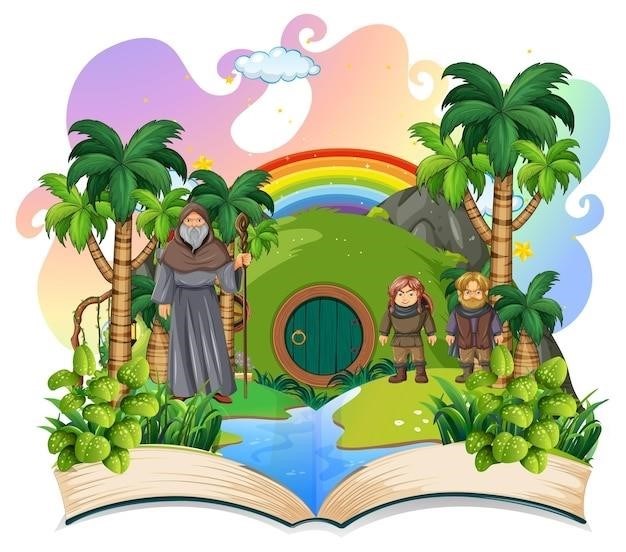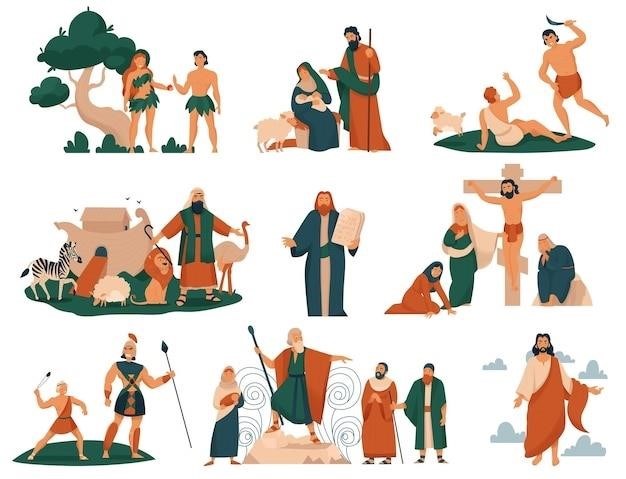Bible Characters and Their Stories⁚ A Comprehensive Guide
This comprehensive guide explores the lives and legacies of pivotal figures from the Bible․ Discover their inspiring stories, challenges, and enduring impact on faith and history․ Download the PDF for a deeper dive into these compelling narratives․
The Bible, a collection of sacred texts revered by billions worldwide, is a rich tapestry woven with countless threads of individual stories․ These narratives, spanning millennia and diverse cultures, offer profound insights into the human condition, exploring themes of faith, love, loss, betrayal, redemption, and the enduring struggle between good and evil․ From the creation of the world to the promise of salvation, the Bible’s characters are not merely historical figures; they are complex individuals whose triumphs and failures resonate deeply with readers across time and cultures․ Their experiences, both personal and communal, provide a framework for understanding human nature, societal dynamics, and the ever-present search for meaning and purpose․ This exploration delves into the lives of key biblical figures, examining their motivations, their relationships, and the lasting impact they’ve had on religious thought and practice․ Understanding these characters provides a crucial key to interpreting the overarching message of the Bible and appreciating its enduring relevance in contemporary society․ The narratives are not simply historical accounts; they are allegories and parables, offering timeless lessons on morality, faith, and the human spirit․ The PDF accompanying this guide provides a more detailed exploration of these captivating characters and their remarkable journeys;
II․ Patriarchs and Matriarchs⁚ The Foundation of Faith
The foundational narratives of the Hebrew Bible center around the lives of the patriarchs and matriarchs – Abraham, Sarah, Isaac, Rebekah, Jacob, and Leah – whose journeys shaped the destiny of a nation and laid the groundwork for a covenant relationship with God․ These figures, often grappling with profound challenges and unwavering faith, exemplify the complexities of human experience within a divine context․ Abraham’s willingness to sacrifice his son Isaac showcases the depths of his devotion, while Sarah’s patience and resilience in the face of barrenness highlight the power of faith amidst adversity․ Jacob’s struggles, marked by deception and eventual repentance, demonstrate the transformative potential of divine grace․ The matriarchs, often overlooked in traditional narratives, played pivotal roles, their strength and wisdom shaping their families and influencing their descendants․ Their stories explore themes of fertility, family dynamics, and the enduring power of faith in the face of uncertainty․ The PDF resource further explores the individual stories of these foundational figures, illuminating the intricacies of their lives and the significant impact they had on the development of the Israelite people and their covenant with God․ Their trials and triumphs provide lasting lessons about faith, obedience, and the enduring promise of God’s grace․

A; Abraham⁚ Father of Faith and Promise
Abraham, a pivotal figure in the Abrahamic faiths, stands as a testament to unwavering faith and obedience․ His story, recounted in Genesis, begins with a divine call to leave his homeland and journey to a promised land, a testament to his trust in God’s unseen hand․ This act of faith, a complete surrender to the divine will, established him as the father of a chosen people and the ancestor of numerous nations․ The narrative emphasizes the testing of Abraham’s faith, most notably in the near-sacrifice of his son Isaac, a profound act of obedience that solidified his status as a model of faith for generations to come․ His covenant with God, marked by circumcision as a sign of the covenant, established a unique relationship between God and his descendants․ Abraham’s journey is not without its complexities; he wrestled with doubt, faced hardship, and experienced moments of human weakness․ Yet, through it all, his unwavering belief in God’s promises remained steadfast․ The PDF delves deeper into the multifaceted nature of Abraham’s character, exploring his interactions with other figures, his successes and failures, and the lasting legacy of his faith in shaping the history and religious beliefs of countless individuals and communities․ His story continues to inspire and challenge believers, reminding them of the power of faith in the face of uncertainty and the enduring nature of God’s promises․
B․ Sarah, Rebekah, Rachel, and Leah⁚ Women of Strength and Resilience
These four matriarchs, central to the narratives of Genesis, represent diverse expressions of faith, resilience, and perseverance within challenging patriarchal structures․ Sarah, wife of Abraham, embodies unwavering faith despite her initial barrenness, ultimately becoming the mother of Isaac․ Rebekah, known for her shrewdness and diplomacy, played a crucial role in Jacob’s acquisition of his brother Esau’s birthright․ Rachel, Jacob’s beloved wife, endured years of longing for children, her perseverance eventually rewarded with the birth of Joseph and Benjamin․ Leah, Jacob’s less-favored wife, faced the complexities of familial rivalry and societal expectations, ultimately bearing several sons who would become the founders of major Israelite tribes․ Their stories, interwoven with those of their husbands and sons, highlight the strength and agency of women within a predominantly male-dominated society․ The PDF explores the multifaceted roles these women played, analyzing their individual struggles, their contributions to their families and communities, and their lasting influence on the development of the Israelite nation․ Their lives illustrate the resilience of women in the face of adversity, their capacity for profound faith, and the significant roles they played in shaping the course of history, often in ways that challenge conventional expectations․ Each woman’s unique contribution to the biblical narrative provides valuable insight into the complexities of faith, family, and societal expectations in ancient times․
III․ Moses and the Exodus⁚ Liberation and Covenant
The story of Moses and the Exodus is a cornerstone of Jewish and Christian faith, a powerful narrative of liberation, divine intervention, and the establishment of a covenant․ Born into slavery in Egypt, Moses was rescued and raised in Pharaoh’s household, later discovering his true heritage and his calling to lead his people to freedom․ The Exodus account details the ten plagues inflicted upon Egypt, culminating in the dramatic parting of the Red Sea, allowing the Israelites to escape their oppressors․ This miraculous escape was followed by the receiving of the Ten Commandments at Mount Sinai, establishing a covenant between God and his chosen people, outlining the moral and legal framework for their society․ Moses’ leadership was tested repeatedly throughout the journey through the wilderness, demonstrating both his unwavering faith and his struggles with doubt and the challenges of leading a vast and often rebellious population․ The PDF delves into the theological and historical significance of the Exodus, exploring its themes of oppression and liberation, divine power and human fallibility, and the enduring legacy of the covenant relationship between God and Israel․ The narrative’s impact on subsequent religious and political movements is also examined, highlighting its continued resonance across cultures and centuries․ His unwavering devotion and leadership shaped the Israelites’ journey, leaving an indelible mark on the religious landscape․
IV․ The Judges⁚ Deliverance and Disobedience
Following the Exodus and the establishment of the covenant, the Israelites entered a period characterized by cycles of disobedience and subsequent deliverance by divinely appointed judges․ This era, detailed in the Book of Judges, portrays a recurring pattern⁚ the Israelites stray from God’s law, falling into idolatry and oppression at the hands of their enemies․ In response, God raises up judges—military leaders and charismatic figures—to deliver his people․ These judges, such as Deborah, Gideon, Samson, and Jephthah, each possessed unique strengths and faced unique challenges․ Deborah, a prophetess and judge, led the Israelites to victory over the Canaanites․ Gideon, despite his initial doubts, bravely led his army against the Midianites․ Samson, blessed with superhuman strength, employed it against the Philistines, while Jephthah, a warrior, demonstrated both courage and tragic flaws․ The book of Judges highlights the consequences of disobedience and the ongoing need for God’s intervention․ The PDF explores the individual stories of these judges, examining their successes, failures, and the broader implications of their leadership within the historical and theological context of the period․ It delves into the recurring themes of faith, betrayal, and the cyclical nature of Israel’s relationship with God during this tumultuous era․ The examination of these narratives provides a rich understanding of the struggles and triumphs within early Israelite history․

V․ Kings and Prophets⁚ Power, Prophecy, and the Rise and Fall of Kingdoms
The period of the kings marks a significant shift in Israelite history, transitioning from a decentralized society of judges to a unified monarchy․ This era, detailed in the books of Samuel, Kings, and Chronicles, witnesses the rise and fall of kingdoms, shaped by the actions of powerful kings and the prophetic voices that challenged and guided them․ The reigns of Saul, David, and Solomon represent a dynamic period, showcasing both the glories and the perils of centralized power․ Saul, initially a successful leader, ultimately succumbed to disobedience․ David, a shepherd boy turned king, established a dynasty marked by both military triumphs and personal failings․ Solomon, known for his wisdom and prosperity, oversaw a golden age, but his later reign was marked by increasing social and economic inequalities․ Concurrently, prophets like Nathan and Elijah served as critical voices, challenging the kings and reminding them of their responsibilities before God․ The subsequent division of the kingdom into Israel and Judah led to further conflicts and the eventual exile․ This section of the PDF explores the complex interplay between kingship, prophecy, and divine judgment․ It analyzes the actions of key figures, examining their strengths and weaknesses, and tracing the consequences of their choices on the trajectory of the Israelite nation․ The detailed accounts offer a nuanced understanding of the complexities of power, faith, and the ongoing tension between human ambition and divine will․ Through a close reading of biblical texts, the PDF sheds light on the significant historical and theological shifts that shaped the destiny of the ancient kingdoms․
A․ David and Solomon⁚ The Golden Age of Israel
David’s reign, marked by military prowess and divine favor, ushered in a period of unprecedented stability and expansion for the united kingdom of Israel․ His rise from shepherd boy to king, detailed in 1 and 2 Samuel, is a compelling narrative of faith, courage, and divine election․ David’s victories solidified Israel’s position as a regional power, culminating in the capture of Jerusalem, which he established as his capital․ His piety and devotion to God are central themes, yet the narrative also acknowledges his personal failings, including adultery and murder․ Despite these flaws, David’s legacy endures as a pivotal figure in the history of Israel, establishing a dynasty that would continue through his son, Solomon․ Solomon, known for his wisdom and wealth, inherited a powerful kingdom, building upon his father’s achievements․ He is celebrated for his construction of the magnificent Temple in Jerusalem – a monumental undertaking that symbolized the nation’s faith and prosperity․ The reign of Solomon represents the peak of the united kingdom’s power and influence, a time of economic prosperity and cultural flourishing․ The PDF explores the reigns of David and Solomon in depth, examining their achievements, their failures, and the lasting impact they had on the religious, political, and social landscape of ancient Israel․ It delves into their respective strengths and weaknesses, offering a balanced perspective on these complex and influential figures․
B․ Elijah and Elisha⁚ Prophets of Fire and Miracles
Elijah, a fiery prophet known for his unwavering faith and confrontations with the prophets of Baal, stands as a testament to God’s power and the importance of unwavering devotion․ His dramatic showdown on Mount Carmel, vividly described in 1 Kings 18, is a cornerstone of biblical narratives, showcasing a powerful display of God’s intervention against idolatry․ Elijah’s miracles, including calling down fire from heaven and raising a widow’s son from the dead, highlight his extraordinary connection to the divine․ His eventual ascension to heaven, a spectacular event recounted in 2 Kings 2, cemented his legendary status․ Elisha, Elijah’s successor, inherited his mantle of prophetic power, continuing the legacy of miracles and unwavering faith․ He performed numerous astonishing feats, including multiplying oil, providing sustenance during a famine, and healing Naaman the Syrian․ Elisha’s stories, found in 2 Kings, are filled with both divine power and compassion․ He demonstrated God’s power through many miracles, and the PDF explores these in detail, analyzing the significance of each event within the broader context of the Old Testament․ The contrasting personalities and prophetic ministries of Elijah and Elisha reveal diverse aspects of God’s character and the multifaceted nature of prophetic ministry․ The PDF further explores their societal impact and their enduring legacy in religious tradition․
VI․ The Prophets⁚ Voices of Warning and Hope
The prophets of the Old Testament, a diverse group of individuals, served as God’s messengers, conveying both warnings and promises to the people of Israel and surrounding nations․ Their messages, often challenging and uncomfortable, called for repentance, social justice, and faithfulness to God’s covenant․ Figures like Isaiah, with his powerful pronouncements of judgment and prophecies of a future Messiah, offer profound insights into God’s plan for humanity․ Jeremiah, known for his lamentations and unwavering obedience despite persecution, exemplifies the prophet’s role as a voice of conscience, even in the face of adversity․ Ezekiel, with his symbolic visions and pronouncements of restoration, provides a message of hope amidst despair․ Hosea, using the metaphor of his troubled marriage to illustrate God’s enduring love for Israel, presents a powerful image of divine grace and forgiveness․ The detailed accounts in the PDF explore the unique contributions of each prophet, examining their historical context, their prophetic messages, and their enduring relevance to contemporary faith․ The diverse styles and approaches employed by these prophets offer a rich tapestry of theological insights and moral guidance, showcasing the complex relationship between God and His people․ Their words continue to resonate, offering both warnings and hope for individuals and societies today, as explored in greater depth within the accompanying PDF․
